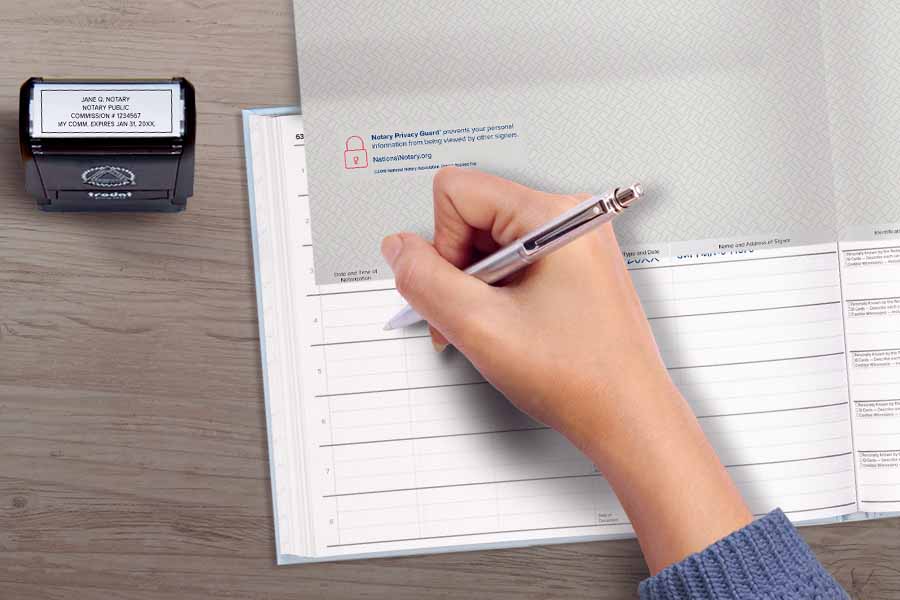
The entries in a Notary journal are an important protection against lawsuits and accusations of negligence — but only if they are properly entered and maintained. When keeping a journal, make sure you avoid these 3 common misconceptions:
Misconception 1: You can skip making a Notary journal entry for a repeat signer
Some Notaries mistakenly assume that if they are notarizing for a signer who is a repeat customer, there’s no need to make a new journal entry. This is an easy way for the Notary to get into trouble. In most states requiring a journal, such as California and Texas, the law clearly requires Notaries to record a journal entry for each official act they perform. Failing to do so is a violation of the law.
There are a couple of state exceptions. In Arizona, if a Notary performs more than one notarization for an individual within a 6-month period, the individual must provide satisfactory evidence of identity and sign the journal only the first time. So while a Notary must complete a journal entry for these repeat notarizations, certain elements may be skipped.
In Nevada, a Notary who performs more than one notarial act for a signer at the same time may make one entry in the journal for multiple acts on one document or on similar documents. Nevada also permits Notaries to waive an individual's signature in the journal entry if the Notary has personal knowledge of the identity of the individual, the Notary has performed a previous notarization for the individual within the past 6 months, the individual is an employer or coworker of the Notary and the notarial act must relate to a transaction performed in the ordinary course of the individual’s business. In this case, the Notary would enter “known personally” in the journal to note how the individual was identified.
Even if you are commissioned in a state where keeping a journal is not required (such as Connecticut) or where journals are only required if you perform remote notarizations (such as Florida) skipping a journal entry for a notarization can still cause you serious legal problems if you are named in a Notary lawsuit at a later date. Without a journal entry providing evidence that you performed the notarization correctly, you could be held liable for any damages stemming from problems with the notarization.
Misconception 2: You can keep photocopies of a signer’s documents or IDs
Some Notaries ask for or make photocopies of signers’ documents or identification to supplement their journal entries, mistakenly thinking that this provides better protection for them than journal entries alone. In most states, Notaries should not do this because the Notary is only required to ask for information required by state law for the journal entry. Requesting or making photocopies is a potential breach of privacy because documents and IDs could contain sensitive personal information.
There are a few states with exceptions. Notaries in Arkansas may keep a copy of a document the Notary has photocopied and copy-certified for their records as evidence that the certified document has not been altered. Missouri and West Virginia Notaries are required to keep a copy of any document they certify as a true copy.
Some states, such as Texas, prohibit Notaries from recording identification numbers such as driver’s license numbers as part of the Notary’s journal records.
Misconception 3: Your Notary journal belongs to your employer
Your Notary journal is always your property, even if your employer paid for it. If you leave your job, your Notary journal goes with you — your employer may not require you to leave it with them.
There are exceptions to this rule. Arizona allows Notaries to keep a separate journal for nonpublic records — such as documents under attorney-client privilege — and the nonpublic journal may be kept by the employer if the Notary leaves. Oregon Notaries may sign an agreement that permits an employer to keep a journal if the employee leaves, but the Notary must keep a copy of the agreement. Tennessee Notaries working for certain financial institutions subject to the Financial Records Privacy Act must follow rules for access to their journals under the Financial Records Privacy Act or Right to Privacy Act. And, while California law clearly affirms that the journal is the Notary’s and may never be surrendered to an employer, the employer may request copies of any journal entries that relate to the business purposes of the employer, provided the copying is performed in the Notary’s presence.
David Thun is the Editorial Manager at the National Notary Association.


Related Articles:
What every Notary needs to know about journals
Additional Resources:
NNA Hotline